Unit_2_What_should_I_do复习课件
八年级英语下册_unit2_what_should_I_do课件人教版.Section_A

• (5)be +形容词+enough for sb to do sth • be+not+形容词+enough for sb to do sth • The questions are easy enough for students to understand. • The questions are not difficult enough for students to understand.
Grammar should (shall) could (can)
情态动词和其他动词连用,可表示说话人的语气, 可表达建议、要求、可能和意愿等, 没有人称和 数的变化。
a. should与 could用于表示劝告、建议时, 可理解为“应该” , could比should语气委 婉。 b. should (shall)用于表示“必定”。 c. could (can)用于表示 “可能”或“预 Should is more serious than could. 测”。
What’s wrong with the dog?
I often feel very tired. What should I do? You look worried. What’s the matter?
What should he do?
He should have a rest.
be in style=be in fashion时髦的 be out of style 不时髦的
你怎么了? 这一问句通常用于看到别人着急、不愉快、生病 或出了某事故时,来问情况的。 类似的表达还有:
1.What’s wrong with sb/sth?
2.What’s the matter with sb/sth?
Unit 2 What should I do重点知识解析归纳

Unit 2 What should I do? 重点词组归纳及语言要点解析重点词组归纳1. keep sb out (of the door ) 把某人拦在门外2. argue with sb (on sth)与某人争吵某事3.What’s wrong with ...? …怎么了/出什么事了?what’s the matter/trouble with... ?4.out of style 过时的5.in style 时髦的6. call sb up =phone/telephone sb. 打电话给某人7.call sb at +电话号码打电话8.to one’s surprise 令我惊奇的是9.be surprised at sth 吃惊于10. pay for sth 付钱11. get/be upset 不安/沮丧12.make sb upset 使某人不安13. as +adj/adv as possible 尽可能...14. under some pressure 在压力之下15. complain +that从句抱怨…complain about sth to sb=complain to sb about sth 向某人抱怨关于某事16.send sb sth =send sth to sb 送某物给某人pare sth with sb 把…跟…进行比较18.on the one hand…, on the other hand… 一方面......;另一方面......19.enough money 足够的钱20. ask for sth. 寻求/要......21. leave sth 落下某物22. tell sb to do sth 告诉某人做某事23. get alone well =get on well (with sb) 相处得好24.give sb some advice 给某人一些建议25.a piece of advice 一条建议26.fit into 融入…之中27.It’s time for sth. = It’s time to do sth . 该做某事的时候了28. not… until… 直到…才…29.It seems that从句=主语seems to do 似乎30.one/数词+ more sth 再要一个/多个某物语言要点解析1. borrow v. 借入I think you should borrow some money from your friends. (P12)我想你应该向朋友借钱。
Unit 2 What should I do
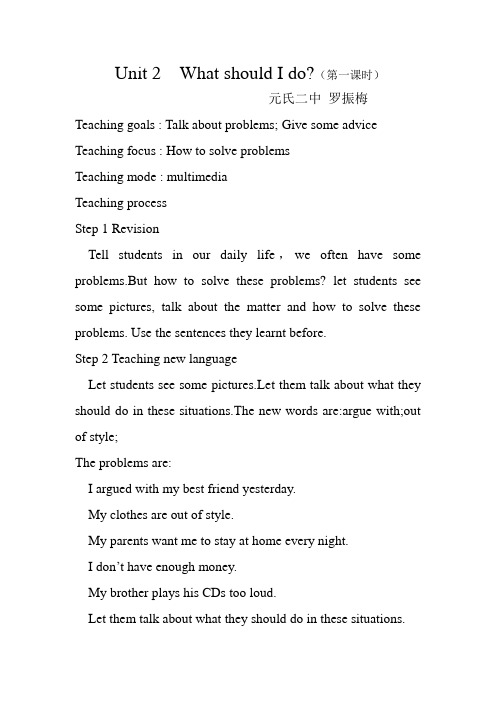
Unit 2 What should I do?(第一课时)元氏二中罗振梅Teaching goals : Talk about problems; Give some advice Teaching focus : How to solve problemsTeaching mode : multimediaTeaching processStep 1 RevisionTell students in our daily life,we often have some problems.But how to solve these problems? let students see some pictures, talk about the matter and how to solve these problems. Use the sentences they learnt before.Step 2 Teaching new languageLet students see some pictures.Let them talk about what they should do in these situations.The new words are:argue with;out of style;The problems are:I argued with my best friend yesterday.My clothes are out of style.My parents want me to stay at home every night.I don’t have enough money.My brother plays his CDs too loud.Let them talk about what they should do in these situations.Let them use You should…You could…to solve these problems.The advice may be:You should say you’re sorry.You should buy some new clothes.You should talk with them about your problems.You could get a part-time job.You should talk to him about your problem.Step 3 listening practiceRead the instructions to the class.Say,Listen to the tape circle the problems that tou hear the girls talking about.Check the answers.The following problems should be circle:My parents want me to stay at home every night.My brother plays his CDs too loud.I don’t have enough money.My clothes are out of style.Let students read the listening material together.Ask a student what the girl’s problems are.Step 4 Speaking practiceThis activity provides guided oral ing the target language.Let students practice this dialogue.They can practice like this:A: You look unhappy, what’s the matter with you?B: …what should I do?A: Maybe you should…/you could…B: Good idea.Make conversations like this. Tell students give more advice as much as possible.Step 5 Writing practiceLet students translate a Chinese article into English.The Chinese article is:这几天,我不高兴。
英语:Unit_2_What_should_I_do知识点训练课件(人教新目标八年级下)
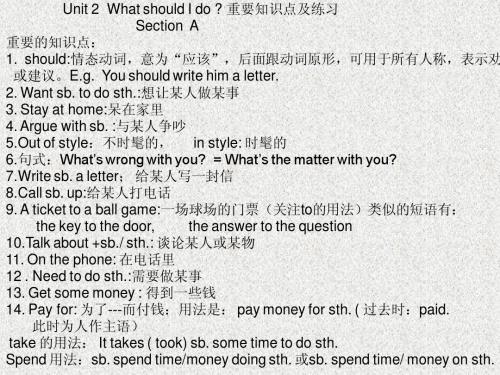
7.—I think you should go to bed early every day. A. Thank you for helping. C B. Of course. C. It doesn’t matter. D .That’s a good idea. 8.”_______” “I argued with my best friend.” A. How are you? B B. What’s wrong? C. Can I help you? D .Good morning! 三.句型转换: 1 .Could you ask him to give me a call, please? (改写同义句) Could you ask him to _____ _____ ______, please? call me up 2 .Dave had a headache last night.(对划线部分题问) _____ _____ _____ _____ with Dave? What the matter with 3. You should buy some new clothes. What should do _____ _____ I _______? 4. He should ask their parents for some money.(否定句) shouldn’t ask any He ________ _____ their parents for ______money. 5. The room is too small to hold so many people.(同义句) big enough The room isn’t ______ ______ to hold so many people. 6. His father bought him a new computer.(同义句) His father bought a new computer _____ him. ______ for 7.Tom spent 20 yuan on a book last Sunday.(同义句) paid for Tom _____ 20 yuan _____ a book last Sunday. 8.The box is too heavy for me to carry.(同义句) The box isn’t light enoughfor me to carry. _____ _____ 9. Anna paid 200 yuan for the new jacket.(同义句) Anna spent yuan _____ the new jacket. ______ on
原创课件八年级下Unit2What should I do 演示文稿1
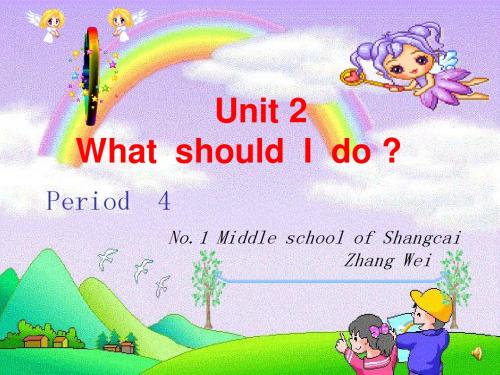
Problem: failed in the English exam Advice: 1. 2. 3. 4. 5.
Step 4
自学导语
Learn 3a
1. Listen the tape carefully. What’ the problem with Lonely Kid ? 2 . Read the letter loudly and guess the words or phrases you don’t understand (3分钟) 3. Read the notes aloud(2分钟)
小组活动导语
1. Each group chooses one or two from the problems and talk about them in your group. 2. Give your advice and make a list ,read it to the class. Do you know which group has the best advice?
2. Why not do sth.? Why don’t you do sth.?你为什么 你为什么 不做某事呢? 不做某事呢
英语八下学习辅导与练习组合Unit02_What_should_I_do__B5纵向版

Unit 02 What should I do ?一、英汉互译1.不让……进入2.与……争吵3.打电话给某人4.给某人写信5.不时髦的、过时的6.用电话交谈7.一张球赛的票8.使某人吃惊9.怎么了10.相处得好11.邀请某人做某事12.生某人的气13.考试失败14.与某人打架15.给我提一些建议16.告诉某人做某事17.一方面18.另一方面19.有组织的活动20.尽可能多的21.靠他们自己22.直到……才23.够忙的24.学会放松25.在太大的压力下26.抱怨27.把……与……比较28.参加29.各种各样的二、根据句意及首字母提示完成单词1.You shouldn’t a________ with your brother, and you should get on well with each other.2.Close the window to k_______ the wind out.3.We were s_____________ at the bad news.4.You are playing your stereo too l_____. Could you please turn it down?5.There is going to be a football match tonight. Can you get a t________ for me? I want to watch it.6.He c________ ride a bicycle when he was only five.7.My mum’s clothes are out of s________. I want to buy some new clothes for her if I have money.8.There are a lot of tall trees on e_________ side of the road.9.My teacher advised me to get a math _______(家庭教师).10.You could find a p____________ job in your free time.11.I don’t know how to learn English well. Could you give me some ______(建议).12.Do you have enough money to ______(付款) for the T-shirt?13.He is a creative man. His work is really _________(新颖的).14.I don’t have much money, so I have to buy the clothes which are ___________(不昂贵的).15.I like this seat more because it’s __________(舒服) than that one.16.I don’t think friends should _________(穿) the same clothes.17.The twin brothers have the same __________(发型).18.I never have a f_________ with my brother. He’s very kind to me.19.I don’t know what to do. Could you please give me some a______?20.I f_______ my English exam last term, so I study hard this term.st week, Lily borrowed my math book and didn’t r_________ it.22.He is a_______ with me. What should I say to him?三、单项选择( )1.Don’t worry. He is ______ to look after little Betty.A.carefully enoughB.enough carefulC.careful enoughD.enough carefully ( )2.—I hear you have got a ticket ____ the basketball match.—Yes, I got it ____ my uncle. A.of,from B.to, by C.to, from D.or, to( )3.The teacher told my father ______ last night.A.call him upB.to call him upC.called up himD.to ring up him( )4.—__________? —My pen doesn’t work.A.What’s wrongB.Can I help youC.What’s itD.What’s matter( ) 5._____ my surprise, he passed the exam. A.For B.In C.To D.On( ) 6.I’m not happy, because I argued ______ my best friend ______ the gift .A.to, aboutB.as, onC.like, onD.with, about( ) 7.I need ______ some money to buy this CD player. What should I do?A.to getB.getC.gettingD.got( ) 8.I don’t often go to the movies, and Ann doesn’t , _____.A.tooB.alsoC.eitherD.as well( ) 9.Oh, you bought a second-hand car. How much did you ______ for it ?A.spendB.payC.takee( ) 10.Maybe you could buy some flowers _______ her. A.with B.for C.on D.to ( ) 11.—May I _____ your CD player? —Certainly, but you can’t _____ it to others.A.borrow, keepB.lend, keepC.keep, borrowD.borrow, lend( ) 12.Most of my classmates don’t like to talk with their parents, but I am ______ them. I love to talk with my parents. A.the same as B.different from C.interested in D.angry with ( ) 13.—Could I borrow your MP4? —Yes, of course you ______. A.can B.could C.will D.must( ) 14.My elder sister bought _____ for me yesterday afternoon.A.two clothesB.two clothingsC.two dressD.two pieces of clothing( ) 15.The teacher told him _____ late any more. A.not to be B.to be not C.be not D.not be( ) 16.Please do the same things ______ I do. A.like B.as C.so D.to( ) 17.If he doesn’t want to do the job, does ____ want to?A.everybody elseB.anybody elseC.else anybodyD.else everybody( )18.Maybe you can think of some good advice______ her. A.to B.for C.in D.with ( )19.—May I use your pen? —Sorry. I _______ it at home this morning.A.forgetB.leftC.have forgottenD.was leaving( ) 20.There are so many dolls in the shop. I really can’t decide _______.A.when to chooseB.what to chooseC.which one to chooseD.to choose which( ) 21.Can you invite Erin _____ tennis with us? A.to play B.plays C.playing D.play ( ) 22.Everybody has seen the film ______ Lucy. So she knows nothing about it.A.besidesB.andC.withD.except( ) 23.Zhang Yining ____ the national team in 1993 and then she _____ a lot of ping-pang matches. A.joins, takes part in B.joins, took part in C.joined, takes part inD.joined, took part in( ) 24.Write _______ and try not to make any mistakes.A.as careful as possibleB.as careful as you canC.most carefulD.more careful ( ) 25.The Greens _____ going to fly to England next month. A.is B.are C.will D.shall ( ) 26.It’s a serious problem. We can’t decide _____ Mr Harris comes back.A.whileB.sinceC.untilD.so( ) 27.Most young people find ______ exciting to watch a football match.A.itB.thisC.thatD.one( ) 28.His handwriting can’t be compared ______ his father. A.to B. with C.on D.for四、用所给词的适当形式填空1.We have lots of after-school activities. Our school life is very _____(color).2.The dress is very nice but __________(expensive), I’ll get it.3.Jane has _______(nice) clothes than Mary ______(do).4.Lucy’s haircut is the same as ________(me).5.My English teacher often wears _________(fashion) clothes.6.Mike was ________(invite) to Peter’s birthday party.7.Paul always thought he ______(be) popular at school.8.Yesterday Alan’s sister _______(lose) her sports clothes.9.We don’t know what __________(do) next.10.My classmates all went to the movies except ______(I).11.He is getting on ________(good) with his English.12.Everyone ____________(invite) to his birthday party yesterday.13.Let the boys _________(speak) English.14.You should_______(talk) about your problems with your parents.15.I want ____________(be) happy.16.They have _______(free) to do what they want to do.17.The students complain about ________(have) much homework to do.18.I saw a boy ________(cry) when I crossed the street.19.I am under too much __________(press).20.They really need time ________(play).21.Parents are trying _______(plan) their kid’s lives for them.22.The clothes are the same as my _________(friend).23.I find it hard ________(get) on well with him.24.I won’t tell him until he ______(come) back tomorrow.五、句型转换1.You should drink some hot water at once.(对划线部分提问) ___________ __________ I do ?2.What’s the matter with Kim?(同义句转换) ________ ________ _________ Kim?3.My clothes are not in style. (同义句转换) My clothes are _________ ________ style.4.I wrote a letter to my father yesterday. (同义句转换) I _________ _______ my father yesterday.5.Please remember to call me up. (同义句转换)Please remember to _______ _______ _______ _______.6.Anna paid 500 dollars for the new jacket. (同义句转换)Anna _______ 500 dollars ________ the new jacket.7.I borrowed a book from him yesterday. (同义句转换) He ________ a book ________ me yesterday.8.We should heip him write letters.(改为否定句) We __________ __________ him write letters.9.She bought me a new bike. (同义句转换) She bought ______ ______ ______ ______ .10.He has some bananas in the bag, and I have some, too. (改为否定句)He _______ _______ _______ bananas in the bag, and ______ _______ _______ _______, _________.11.You don’t have enough money, ________?(完成反义疑问句)12.I don’t know what I can do for my mistakes.(改为简单句)I don’t know ______ ______ _______ for my mistakes.13.Lily needs some money to buy gifts for her mother. (改为否定句)Lily _______ _______ _______ money to buy gifts for her mother.14.I’m twelve years old. My sister is twelve years old, too.(合并成一句话)I’m ______ ______ _______ _______ my sister.15.Li Lei had a fight with his brother yesterday. (同义句转换)Li Lei ___________ ________ his brother yesterday.16.The thief ran away as quickly as possible when he saw a policeman. (同义句转换)The thief ran away _______ _______ ________ ________ ________ when he saw a policeman. 17.I didn’t leave before he came back. (同义句转换) I ________ ________ _________ he came back.18.I find that to learn English well is difficult. (同义句转换)I find _______ _______ ________ learn English well.19.Some friends send him some money. (同义句转换)Some friends send some money ________ ________.20.My friend gets on well with his classmates.(对划线部分提问)_______ _______ your friend get on with his claeemates?Unit11、原句There will be fewer people.(P3)Fewer的用法Fewer 是few 的比较级,表示更少,用来修饰可数ne.g There will be fewer trees in the future.比较lessLess 是little 的比较级,也表示“更少”,但用来修饰不可数n2、原句I think I will live in an apartment with my best friends,because I don’t like living alone. Alone 与lonelyalone主要强调目前是一个人的状况,没有同伴。
八年级英语 unit2 what should I do课件人教

My clothes are out of style.
不时髦的
Look at the problems in activity 1a and make conversations.
A: What’s wrong?
B: My clothes are out of style. A: Maybe you should buy some new clothes.
1a Look at these problems. Are they serious or not?
Write them in the appropriate box.
Serious
Not serious
My parents want me to stay at home every night.
Task 1:成长中的烦恼
Do you have some problems in your daily life or in your study? Write them down.
1. My parents want me to stay at home every night. 2. I don’t have enough money to… . 3. I argued with … . 4. My friends didn’t invite me to his birthday party. 5. … …
Do you have any good suggestions?
eg: I argued with my best friend. What should I do?
You could … . Maybe you should … . I think you should … . I think you’d better … . You shouldn’t … .
八年级英语下册-unit2-What-should-I-do整单元课件-人教新目标版
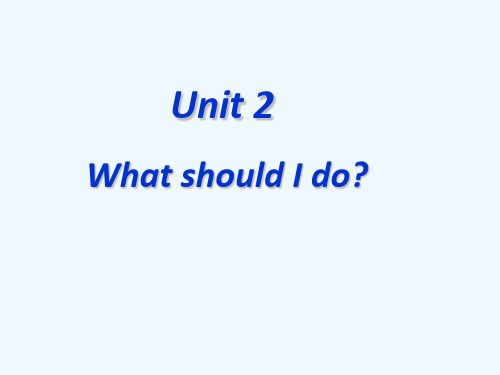
argued with
What's wrong? What should she do?
What's wrong? What’s the matter? What should she do?
...plays his CDs too loud
A: What's wrong? B: My clothes are out of style. A: Maybe you should buy some
Everybody has his or her problems.
I have mine. What's it? My mom plays music too loud. I can't stand it at all. What should I do? You should...
play v.播放
2a Listen. Peter's friend is giving him advice. Circle the word "could" or "should".
____________________
give him a call ______________ phone him
__________________________
2b Listen again.
Why doesn’t Peter like his friend’s advice?
Draw lines to match the advice with the reasons.
Advice
1. You could write him a letter. 2. Maybe you should call him up. 3. You should say you’re sorry. 4. Maybe you could go to his house. 5. You could give him a ticket to a ball game.
八年级英语下册Unit 2 What should I do- 知识讲解

八年级英语下册Unit 2 What should Ido? 知识讲解Unit2whatshouldIdo?【单元目标】1.单词与短语stereo,loud,argue,original,serious,style,wrong,argu ment,either,teen,talk,family,tutor,haircut,caller,e xcept,upset.wantsb.todosth. 2.playone’sstereo 3 stayathome4.arguewithsb/haveanargumentwithsb.5.beoutofstyle6.writesbaletter/writeto7.talkabout8.onthephone9.surprisesb.10.payfor 11.getapart-timejob 12.borrowsth.fromsb.13.asksb.for…14. haveabakesale 15.findout16.beupset17. call…up 18.thesameas9. getonwellwithsb.20. returnsth.21.haveafightwithsb.22.from…to…23. dropoff 24.preparefor25.after-schoolclubs26.beusedto27.fillup 28.takethemiddleroad2.目标句型:.whatshouldIdo?2.whydon’tyou…?3.youcould…4.youshould…5.youshouldn’t…3.语法情态动词的用法Ⅰ【重难点分析】情态动词Ⅰ*情态动词也可称为“情态助动词”,因为它和基本助动词都属于助动词类。
*情态动词和其他动词连用,可表示说话人的语气。
*情态动词可表达建议、要求、可能和意愿等。
*情态动词没有人称和数的变化。
*常用的情态动词有:can,could,may,might,must,shall,should,will,would这九大情态动词;其他的还有oughtto,need,dare等。
Unit 2 What should I do
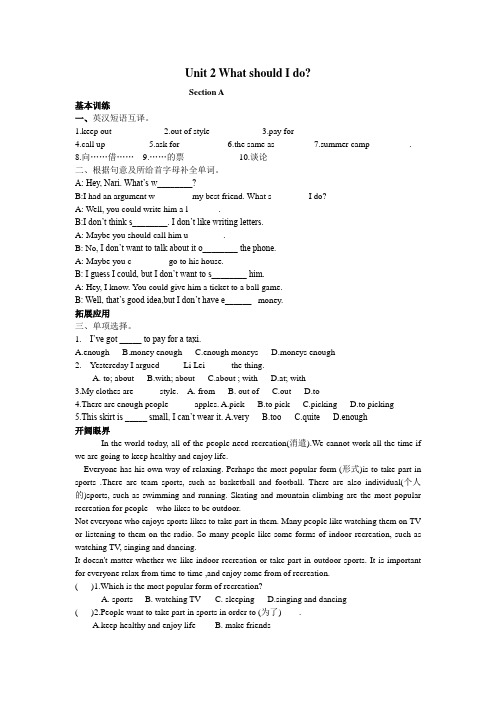
Unit 2 What should I do?Section A基本训练一、英汉短语互译。
1.keep out__________2.out of style__________3.pay for__________4.call up________5.ask for_________6.the same as_________7.summer camp_________.8.向……借……9.……的票____________ 10.谈论_________二、根据句意及所给首字母补全单词。
A: Hey, Nari. What‟s w________?B:I had an argument w________ my best friend. What s________ I do?A: Well, you could write him a l_______.B:I don‟t think s________. I don‟t like writing letters.A: Maybe you should call him u________.B: No, I don‟t want to talk about it o________ the phone.A: Maybe you c________ go to his house.B: I guess I could, but I don‟t want to s________ him.A: Hey, I know. You could give him a ticket to a ball game.B: Well, that‟s good idea,but I don‟t have e_______ money.拓展应用三、单项选择。
1.I‟ve got _____ to pay for a taxi.A.enoughB.money enoughC.enough moneysD.moneys enough2.Yestereday I argued _____Li Lei _____ the thing.A. to; aboutB.with; aboutC.about ; withD.at; with3.My clothes are _____ style. A. from B. out of C.out D.to4.There are enough people _____ apples. A.pick B.to pick C.picking D.to picking5.This skirt is _____ small, I can‟t wear it. A.very B.too C.quite D.enough开阔眼界In the world today, all of the people need recreation(消遣).We cannot work all the time if we are going to keep healthy and enjoy life.Everyone has his own way of relaxing. Perhaps the most popular form (形式)is to take part in sports .There are team sports, such as basketball and football. There are also individual(个人的)sports, such as swimming and running. Skating and mountain climbing are the most popular recreation for people who likes to be outdoor.Not everyone who enjoys sports likes to take part in them. Many people like watching them on TV or listening to them on the radio. So many people like some forms of indoor recreation, such as watching TV, singing and dancing.It doesn't matter whether we like indoor recreation or take part in outdoor sports. It is important for everyone relax from time to time ,and enjoy some from of recreation.( )1.Which is the most popular form of recreation?A. sportsB. watching TVC. sleepingD.singing and dancing( )2.People want to take part in sports in order to (为了)____.A.keep healthy and enjoy lifeB. make friendsC.find a good jobD. make mov e moneySection B基本训练一、词形变换。
八年级英语下册_unit2_what_should_I_do课件人教版

Yours,
Mary
I. 根据汉语提示,完成下列句子。每空一词。
1. 我花了五美元买这些书。 paid for spent on I ________ five dollars ________ the books. 2. 我问他如何才能学好英语。 how to learn I asked him _______________ English well. 3. 你认为她会和你就那件事争吵吗? argue with about Do you think she will _________you ________ that?
Language points:
1. find out,找出;查明 find out 意为“找出” “发现” “ 查出(真 相) ” find和find out都有发现的意思,二者的语义差别是:find往往指凭一时的
直接感觉或偶然发现,而find out则需经一番努力后发现出来,有“查明,
弄清”的意思。
2. I don’t know what to do. 我不知道该做什么。
疑问词 + 动词不定式结构,表示一个完整的 含义,在句中可以做主语,宾语,表语等。 这种结构经常放在tell,show,teach,forget,find out等词后作宾语。
I can’t decide where to go for vacation. I asked her how to make dumplings.
Language points:
tell sb. to do sth. 告诉某人做某事 Mother told me to have healthy food to keep fit. tell sb. not to do sth. 告诉某人不做某事 The teacher tells us not to talk in class.
八年级英语unit 2 what should i do人教版(新目标)知识精讲
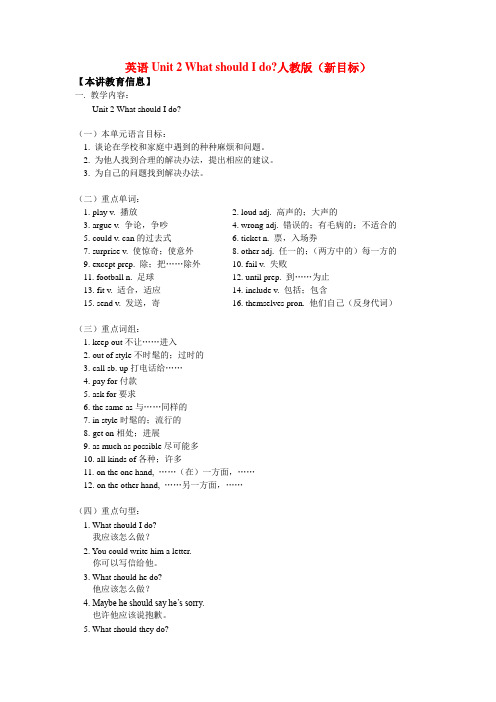
英语Unit 2 What should I do?人教版(新目标)【本讲教育信息】一. 教学内容:Unit 2 What should I do?(一)本单元语言目标:1. 谈论在学校和家庭中遇到的种种麻烦和问题。
2. 为他人找到合理的解决办法,提出相应的建议。
3. 为自己的问题找到解决办法。
(二)重点单词:1. play v. 播放2. loud adj. 高声的;大声的3. argue v. 争论,争吵4. wrong adj. 错误的;有毛病的;不适合的5. could v. can的过去式6. ticket n. 票,入场券7. surprise v. 使惊奇;使意外8. other adj. 任一的;(两方中的)每一方的9. except prep. 除;把……除外10. fail v. 失败11. football n. 足球12. until prep. 到……为止13. fit v. 适合,适应14. include v. 包括;包含15. send v. 发送,寄16. themselves pron. 他们自己(反身代词)(三)重点词组:1. keep out不让……进入2. out of style不时髦的;过时的3. call sb. up打电话给……4. pay for付款5. ask for要求6. the same as与……同样的7. in style时髦的;流行的8. get on相处;进展9. as much as possible尽可能多10. all kinds of各种;许多11. on the one hand, ……(在)一方面,……12. on the other hand, ……另一方面,……(四)重点句型:1. What should I do?我应该怎么做?2. You could write him a letter.你可以写信给他。
3. What should he do?他应该怎么做?4. Maybe he should say he’s sorry.也许他应该说抱歉。
人教版初二八年级英语下册 unit 2 what should i doPPT课件
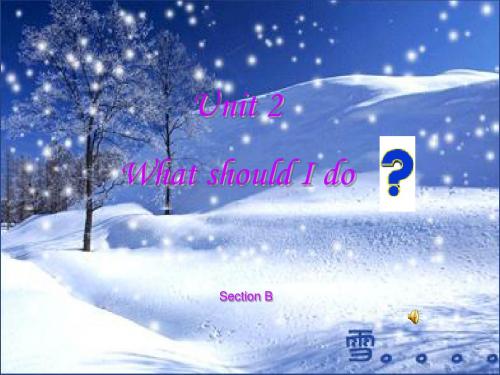
• 2a Listening
___ My friend has nicer clothes than I do . ___ MБайду номын сангаас friend wears the same clothes and has the same haircut as I do.
haircut: 1) when you have a haircut, someone cuts your ___ I don’t my理发 friend’s clothes hair like for you eg: You need a haircut. and haircut. 2) the style your hair is cut in 发型 eg: Do you like my new haircut?
2b What advice do people give Erin?
Person
Advice
She should tell her friend to get different clothes and a different haircut. Nicole She should be happy that her friend likes her clothes and haircut. That’s not a problem.
Kim
Emilio She should find a new best friend.
Typescript
Host: Hi, Erin. thanks for calling Teen Talk 109.1 FM. What’s the problem? Erin: Well, see, I always wear fashionable clothes, and I have a really neat(整洁) haircut. Host: Yes? Erin: It’s my friend, Jasmine. She buys the same clothes as I do, and she even gets the same haircut. She copies everything I do. I want to be original. I want to have my own clothes and my own haircut. Host: Let’s see if a listener has some advice for you. Kim is calling. Hello, Kim. Kim: Hello.
Unit2 What shall I do(二)课件
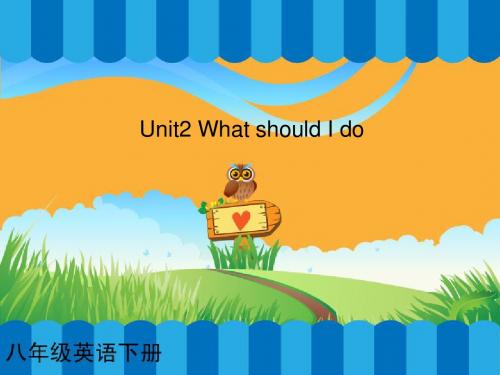
Unit2 What should I doDiscuss: When you choose clothes, what is important to you ?1. They are original.2. They are comfortable.3. They are the same as my friends’ clothes.4. They are in style.5. They are inexpensive.6. They are colorful.•Wordsoriginal 新颖的the same as 与一样in style 时髦的;流行的haircut 理发;发型except 除;把除外upset 心烦的;沮丧的fail 失败get on 相处;进展didn’t = did notcouldn’t= could notListen and check Erin’s problem.•Listening____ My friend has nicer clothes than I do.____ My friend wears the same clothes and has the same haircut as I do.____ I don’t like my friend’s clothes and haircut.√Listen again and complete the chart.•ListeningPerson Advice KimNicoleEmilio Tell your friend to get different clothes and a different haircut.Be happy that your friend likes your clothes and haircut. Find a new best friend.•SpeakingWhat’s your advice for Erin?Tell your partner and say why.A: I think Erin should tell her friend to get different clothes.B: Why?A: Because friends shouldn’t wear the same clothes.Language focus1. find/ find out / look for 的区别:find意为“找到”,重在寻找的结果。
Unit 2.What should I do 知识要点
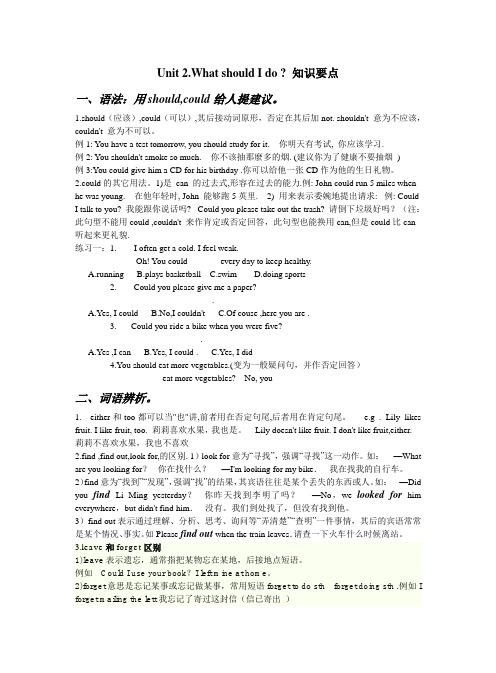
Unit 2.What should I do ? 知识要点一、语法:用should,could给人提建议。
1.should(应该),could(可以),其后接动词原形,否定在其后加not. shouldn't 意为不应该,couldn't 意为不可以。
例1: You have a test tomorrow, you should study for it. 你明天有考试, 你应该学习.例2: You shouldn't smoke so much. 你不该抽那麼多的烟. (建议你为了健康不要抽烟)例3:You could give him a CD for his birthday .你可以给他一张CD作为他的生日礼物。
2.could的其它用法。
1)是can 的过去式,形容在过去的能力.例: John could run 5 miles when he was young. 在他年轻时, John 能够跑5英里. 2) 用来表示委婉地提出请求: 例: Could I talk to you? 我能跟你说话吗? Could you please take out the trash? 请倒下垃圾好吗?(注:此句型不能用could ,couldn't 来作肯定或否定回答,此句型也能换用can,但是could比can听起来更礼貌.练习一:1.------I often get a cold. I feel weak.------Oh! You could _______every day to keep healthy.A.runningB.plays basketballC.swimD.doing sports2.------Could you please give me a paper?--------________________.A.Yes, I couldB.No,I couldn'tC.Of couse ,here you are .3.-----Could you ride a bike when you were five?-------______________.A.Yes ,I canB.Yes, I could .C.Yes, I did4.You should eat more vegetables.(变为一般疑问句,并作否定回答)________ ________ eat more vegetables? No, you __________二、词语辨析。
Unit2(4)What should I do

call up talk say argue found out
2 Reading
1. What did her cousin do last week? She borrowed a math book from the reader. 2. Why couldn’t the reader do her homework? Her cousin didn’t return the math book.
Reading for comprehension Read these statements. Is the situation the same in China? 1. American and British children do many after-school activities. 2. Many children are under pressure..
3. Parents these days push their children much harder than before.
4. Competition between families starts at a young age.
5. Children should have free time to relax.
Translate the following sentences.
• They try to fit as much as possible into their kids’ lives.
他们试图尽可能地填满孩子们的生活.
• Teachers complain about teaching tired kids in 老师们抱怨在课堂上教疲惫的孩子. the classroom. • Pushy parents are nothing new, but now parents seem to push their children a lot more.
人教版八年级下册英语第二单元unit2知识点总结

人教版八年级下册英语第二单元unit2知识点总结Unit 2 What should I do?一丶重点短语1.argue v.争论;争吵argue with sb.与某人吵架I argued with my best friend.我和我的好朋友吵架了。
2.① either adv.(用于否定句)也He doesn’t have any money, and I don’t, either.他没有钱,我也没有。
I can’t play chess. She can’t, either.我不会下国际象棋,她也不会。
② too 也(用于肯定或疑问句)I’m a teacher.He is a teacher, too.我是老师,他也是老师。
3.ask (sb.)for sth.向某人寻求某物;要……Don't ask for food every day.Go and find some work.别天天要饭,找点儿工作做。
I don’t thi nk you should ask your parents for some money.我想你不应向父母要钱。
4.the same as... 与……相同(注意前后两个比较对象的属性保持一致)The clothes are the same as my friends'.这些衣服与我朋友的一样。
Tom is the same age as Anna.=Tom is as old as Anna.汤姆和安娜一样大。
Her backpack is the same as mine. 她的背包与我的一样。
5.except 除……以外;(不包括……在内)My class has been invited except me.除我以外,我的同学都被邀请了。
All the students went to the park except him.除了他之外,全体同学都去过公园了。
Unit_2_What_should_I_do单元练习

Unit 2 What should I do?基础达标Ⅰ. 选择答句1. I don’t know the way to the school.2. I left my books at home.3. There’s something wrong with my bike.4. I need some money.5. The boys are too noisyA. You could borrow them from your classmates.B. You could ask your parents for some.C. You should ask a policeman for helpD. You should mend it by yourself.E. You could ask them to be quiet.Ⅱ. 选择填空1. She tried _______ about her journey, but she found it difficult.A. didn’t to worryB. to not worryC. not worryingD. not to worry2. I think ________ food is fried chicken in the USA.A. more popularB. most popularC. the most popularD. popular3. When you go to see your father, please ________ these books to him.A. bringB. takeC. carryD. put4. I argued ________ my good friends yesterday. What should I do?A. ofB. withC. atD. to5. Han Mei _________ a book from the library a week ago.A. lentB. returnedC. borrowedD. wanted6. --- What can I do for you, sir?--- I’m ________ a book on history.A. making outB. finding outC. looking forD. working outⅢ. 选词并用适当形式填空talk find out call up argue say1.Let’s _______ Joe and invite him to play tennis.2.You should _____ about your problems with your parents.3.My friend is angry with me. What should I _______ to him?4.I don’t want to ______. Let’s forget it.5.I thought I failed my test but I just ________ I passed! 能力提升Ⅰ. 单项选择1. His parents want him _____at home every night.A. stayB. stayingC. to stayD. staies2. She argues ______ her best friend.A. withB. aboutC. atD. and3. I don’t have money. My brother doesn’t have any money, ______.A. eitherB. tooC. alsoD. but4. My twin sister _____the same clothes.A. wearB. wearsC. put onD. puts on5.Could you give me _____ advice?A. someB. anyC. manyD. a lot6. My sister is angry with me. What should I _____to her?A. sayB. speakC. argueD. talk7. His little son could do nothing except_____ TV.A. watchB. watchesC. watchingD. will watch8. Please ______ who broke the window.A. find outB. findC. look forD. look out9. He _____ the pen on the ground just nowA. dropedB. droppedC. fallsD. fell10. He’s used to _____ in the afternoon.A. playB. playsC. playingD. played11. Maybe he put it in his pocket, ______ he?A. doesB. doesn’tC. didD. didn’t12. The boy is ______to go to school.A. enough oldB. enough youngC. old enoughD. young enough13. Please show me the ticket ______the concertA. ofB. forC. toD. on14. I need to get some money to _____the summer camp.A. pay onB. pay inC. pay withD. pay for15. When I arrived home, I remembered that I ____ my key in the classroom.A. forgetB. forgotC. leaveD. left16. They are ______ the summer holiday.A. planningB. planingC. plannedD. plans17. I ______ it everywhere, but I didn’t _____ it.A. looked for, looked forB. looked for, findC. found, looked forD. find, look for18. Our teacher often tells us _____ to the old politely.A. speakB. speakingC. to speakD. speak in19. I really don’t know _________.A. what should I doB. what to doC. what doesD. what doing20. They are good friends, but sometimes they ______each other.A. argue ofB. argueC. argue toD. argue with Ⅱ. 完形填空Once there was a clever farmer. Though he was poor, he decided one day to take the king a roast goose(烤鹅)as a present. He had not had much to eat that day, and soon the l of the roast goose became too much for him as he 2 it to the king, so he ate one of its legs.When he came before the king and gave him the goose, the king 3 . saw that it had only one leg.Now, the king himself was born with one bad leg, so he had never been able to 4 properly (正常地) . When he saw the goose with only one leg, he thought the farmer had 5 this to laugh at him. Of course he was very 6 _. The farmer was told that if anybody laughed at the king, he would be 7 at once."Where is 8 leg of the goose?" the king asked."All the geese in this part of the country have one leg only, " the farmer answered."Do you think I'm a fool?" the king shouted." 9 ," said the farmer, "if you look out of the window, you will see geese with one leg by the 10 . "The king looked, and there the geese were 11 on one leg beside the water. The king at once told one of his men to hit them 12 a big stick, and of course, they 13 their other legs and ran away."There,” s aid the king. "You were lying(说谎). That shows that the geese here have two legs, like all other 14 in the country. ""But it doesn't show anything, " answered the farmer, "if your men threw a big stick like that at me, I would grow two 15 Legs myself to help me to ran away faster. "1. A. head B. neck C. smell D. size2. A. returned B. carried C. sent D. handed3. A. at once B. at last C. by then D. on time4. A. come B. walk C. see D. eat5. A. kept B. done C. made D. found6. A. sorry B. worried C. sad D. angry7. A. helped B. killed C. saved D. covered8. A. other B. another C. that one D. the other9. A. Certainly not B. Of course C. That's nothing D. Never mind10. A. hole B. forest C. lake D. house11. A. swimming B. resting C. flying D. lying12. A. with B. in C. for D. by13. A. sent up B. put down C. did with D. moved away14. A. geese B. animals C. legs D. farmers15. A. slower B. faster C. less D. more Ⅲ. 阅读理解AThough going for a walk is ordinary in Britain, it is just not a part of the American idea. An English reporter who was just walking along the road in Los Angeles was questioned by the policeman because it seemed strange to do so. People can find side-walks beside roads only in town centers. Some suburban(郊区的) roads are so bad that cars have to travel very slowly----too slowly to be dangerous to children. A person who tries to walk at night may find that he is almost twisting (扭伤) his ankle (足踝) on the uneven (不平的) surface, but also there are no lights (the headlights of cars being good enough for the car drivers) and that angry dogs from the houses will run after him. Dogs don't often see anyone walking past. Like Los Angeles policemen, they think he must be up to no good.True or False:( ) 1. Englishmen often take a walk. So do Americans.( ) 2. The American policeman asked an English reporter some questions because he was strange.( ) 3. In America side-walks are only found in town centers.( ) 4. Cars don't travel fast enough on some suburban roads to be dangerous to children.( ) 5. There are no lights on some suburban roads at night.( ) 6. Dogs will follow a person walking at night because they think he is a policeman.BExpert(专家)say that students usually need eig ht to ten hours’ sleep at night, but most Chinese students do not get enough sleep. Some Chinese parents are usually glad to see their children studying late. They will think their children work very hard, but not all parents are happy about this. Once a mother told us tat every morning her 10-year-old boy put up one finger(手指)with his eyes still closed, begging(请求)for one more minute to sleep. Like thousands of students “early birds” in China, he has to get up before six every morning.A report shows th at without a good night’s sleep, students seem to be weaker(虚弱)than they should be. Many students have fallen asleep during class at one time or another. Too much homework is not the only reason whystudents stay up late. Some watch TV or play the computer games late into the night.Experts have ever said that the students should develop good study habits. So some clever students never study last, they are able to work well in class.7. The 10-year-old boy begged for more minute to sleep because__________.A. he didn’t have enough sleepB. it wasn’t time for him to get upC. he didn’t want to go to schoolD. he wanted his mother to wake him up8. In this passage we know if students don’t get enough sleep, they may________.A. become too weak to sleepB. not work well in classC. go to bed earlyD. be weak in English9. In this passage “early birds” means “persons who ______________.”A. get up earlyB. get up lateC. sleep lessD. don’t want to sleep10. “Stay up late” here means “_____________.”A. study lateB. watch TV lateC. not go to bed until lateD. stay outside11. According to the passage, which of the following is right? _________.A. If you want to study better, you must work hard at night.B. Sleeping less means working hard.C. Some clever students are able to work well in class because they have good study habits.D. Students don’t have enough sleep because they have lots of homework to do.Unit 2 What should I do?基础达标Ⅰ. 1. C 2. A 3. D 4. B 5. EⅡ. 1. D, try to do sth.是“试图做某事”的意思。
unit2_what_should_i_do?教案

Step ⅠGreetingGreet the class as usual and check the homework. Step ⅡSection AShow a chart on the screen.ProblemI want to buy a new guitar but I don’t have enough money. Advice1. Wait until next year.2. Don’t buy a guitar.3. Borrow one.4. Buy a used guitar.5. Get a part-time job.And tell students what my problem is. Ask students to give advice.Tell students in this unit we’re going to talk about problems people have and learn how to give these people advice—to tell people what we think they should do.Step ⅢShow the new words on the screen. Read the new words and ask students to repeat.keep out; serious; stereo; loud; argue; out of style Step Ⅳ1aNow please open your books at Page 10.Look at activity 1a please.Point to the problems and ask five students to read the problems to the class.S a: My parents want me to stay at home every night.S b: My brother plays his stereo too loud.S c: I don’t have enough money.S d: I argued with my best friend.S e: My clothes are out of style.Read each sentence again and ask students to repeat it.Ask students to explain in their own words what eachsentence means. They can point to parts of the picture,use actions, simple drawings on the board and simplesentences.Then point out the headings in the box to the class. Tellstudents serious problem is a very bad problem, a verybig problem.Ask students to write the problems in the Serious orNot serious columns.Now talk about the answers with the class.Step Ⅴ1bIn this activity first ask different students to say whatthey see in each picture.Then ask students to listen to the conversation. In thechart circle the problems that they hear the girls talkingabout.Play the recording for the first time. Students onlylisten. And then play it a second time. This time studentscircle the problems they hear.Correct the answers.Step Ⅵ1c PairworkFirst ask two students to read the sample dialogue.Then say, Make conversations like this about theproblems in activity 1a.As students talk, move around the classroom checkingtheir work. Offer language support as needed.In the end ask several pairs of students to say theirconversations to the class.Give them little presents if they do their work well.Step ⅦSummaryThis class we’ve learned some key vocabulary. Andwe’ve learnt how to give somebody advice if he or shehas some problems. If you are interested in joining allkinds of activities in class, you’ll make great progress.Step ⅧHomeworkPlease ask your parents or friends what problems theyhave in order to see if you can give them some goodadvice.2listen to the recording this time, ask students to writePeter’s problem on the blank lines in activity 2a.Then check the answers.Answers: I argued with my best friend.Step Ⅳ2bFirst read the instructions. Show students the examplematch.You could write him a letter. I don’t like writing letters.Ask students to listen again and draw lines to match theadvice and the reasons. Like the sample match.Then play the recording again.Check the answers.Answers: 1.d 2.e 3.a 4.c 5.bStep Ⅴ2c Group workThis activity demands students to role play theconversation between Peter and his friend.First tell students how to do this activity.Point to the example in the sample dialogue. Ask twostudents to read the conversation to the class.Point out the sentences in activity 2b.Ask two studentsto role play a conversation between Peter and his friendusing these two sets of sentences.Then have student work in pairs. First one student isPeter and the other student is Peter’s friend.Then thetwo students change places.At the end check the answers by calling on differentpairs to say a conversation to the class. Praise them fortheir good job.Step ⅥGrammar FocusReview the grammar box. Ask students to say thequestions and the responses.Point out that the word should is always used to ask foradvice, but the words could, should, and shouldn’t areused to give advice.Step ⅦSummary and HomeworkThis class we listened to a conversation and knewabout Peter’s problem and the advice his friend gavehim. And we’ve learnt the three words:could, should,shouldn’t. The three words are used to give advice.After class you can have more practice using the threewords to give some advice.4students write “good idea” “okay idea” or “bad idea”next to each suggestion. Ask them to do the activity ontheir own.Then talk about the students’ answers.Read the firstpiece of advice and ask students to raise their hands ifthey think it is a good idea. Then ask students who thinkthis advice is an okay idea to raise their hands. And thenask students who think it is a bad idea to raise theirhands. Write the scores on the board.Repeat for the other pieces of advice.Step Ⅳ3b PairworkFrist point out the example conversation and ask twostudents to read it to the class.Sa: I need some money to buy gifts for my family. Whatshould I do?Sb: I think you should borrow some money from yourfriends.Sa: Oh, no. I don’t like t o do that.Sb: Then I think you should get a part-time job.Sa: That’s a good idea.Ask students to say some ways to get money that aren’tin the book. Write these on the board and explain theseways to the class. Have students work with theirpartners as they ask for and give advice.In the end ask two or three pairs of students to say theirconversations to the class.Step Ⅴ4 PairworkFirst ask students to look at the picture. Say, This isJim. He is a Canadian boy who has come to live inChina with his parents. He wants to practice hisPutonghua, but he is very shy. Make a list of things Jimcould do.Ask students to complete the work in pairs.Ask a few students to list their advice. Write a list ofthe best advice on the board.Step ⅧSummaryToday we’ve learnt how to give somebody advice.Ihope you can learn to communicate with others and helpsomebody if he or she has some trouble.Step ⅨHomeworkPreview the next page.Finish off the workbook exercises.6810activities.2.Many children are under pressure.3.Parents these days push their children much harder than before.petition between families starts at a young age.5.Children should have free time to relax. Then ask students whether the situation is the same in China. Have them discuss with their partners.3bAsk students write four sentences using one of the words from 1b in each sentence.And invite four students write their sentences on the board.3cIf you are Dr Alice Green. Write a letter to Cathy Taylor. Give advice about what she should do with her children.Step ⅤSection 4 Go for it!4aPressure is a serious problem in today’s world.We should find ways to relax.Are you or your friends under pressure?Do a survey to find out.Show the questions on the screen and ask students to do their surveys.Questions1. When do you feel under pressure?2. What should you do to relax?4bIf there is someone in your class who has a big problem, make a plan to help them.Step ⅥIf you have time!If time permits, role-play interviews between a “psychologist” and a person who is under pressure. Step ⅦSummaryThis class we’ve learned a reading passage.And we knew many families and children are under pressure. We should learn how to work and how to relax. If you have any problems, you should solve them as soon as possible. I wish all of you can have a very happy life. Step ⅧHomeworkPreview the next unit.。
- 1、下载文档前请自行甄别文档内容的完整性,平台不提供额外的编辑、内容补充、找答案等附加服务。
- 2、"仅部分预览"的文档,不可在线预览部分如存在完整性等问题,可反馈申请退款(可完整预览的文档不适用该条件!)。
- 3、如文档侵犯您的权益,请联系客服反馈,我们会尽快为您处理(人工客服工作时间:9:00-18:30)。
5. 该是…的时间了 It’s time for sth = It’s time to do sth
It’s time for homework. =It’s time to do homework.
6. it 作形式主语的结构 It’s +形容词+for sb+to do sth
It’s important for us to study hard.
to one’s surprise
1.怎么啦? What’s wrong? What’s the matter? What’s the trouble(problem)? 2. maybe 用于句首 Maybe you are right. may be 用于句中 It may be true.
3. leave … 离开… 忘记、落下(有具体地点) You left your homework at home. leave for … 动身去某地
翻译下列句子
• 1 我父母希望我每天晚上都呆在家里。 to ______ • My parents want me ___ stay at home every night. • 2 我和最好的朋友争吵起来了。
• I argued withmy best friend. _____ _____
• 3 我不想在电话上谈论它。
• 6. 你可以向你的哥哥借钱。
• You could_______ some money ______ your brother. from borrow • 7.我的朋友与我穿同样的衣服而且跟我发型也一样。
•
• • •
My friend wears ____ ______ clothes and hasthe same ___ ____ the same
sth cost sb +钱
某物花了某人…钱
This book cost me 10RMB.
It takes/took sb +时间 to do sth. 花了某人…时间做某事
It takes me an hour to go to school.
take sb to +地点 把某人带到某地
My father took me to Shanghai yesterday.
I’m old enough to go to school. This book is easy enough for you to understand.
4、同性异构的形容词:这类形容词常以-ing或-ed结尾: interest bore surprise excite amaze 通常以-ing结尾是表示_____________,而以-ed结尾 事物有某种特性 则表示_________________。 某人感到…… 如:It’s really ________ movie. We all felt very boring _______. (bore) bored This is an ___________ story. Children are very interesting ____________ it. (interest) interested in amazing That was really _________ news. They were amazed ___________ about it. (amaze) surprising Your question was very ________. I was very surprised __________how you asked that.(surprise) excited They all felt __________ when they heard that __________ news. (excite) exciting
22.一张…的票
问题的答案 the answer to the question the key to the door 门上的钥匙 23.受太大的压力 under too much pressure 24.抱怨某人做某事 complain sb ae sb doing sth 27.看到做某事(全过程) see sb do sth
write (a letter) to sb 2、write sb. a letter =__________________, 意为__________ 给某人写信 3、enough:意为___,总结:(_________ + 足够 形容词 enough + _to do sth_______)
6、总结“也”的表示方法(also、too、as well和 either) also:用与_______句,放在句_______(中/尾) 肯定 中 too:用与_______句,放在句_______(中/尾) 肯定 尾 as well:用与________句,放在句_______(中/ 肯定 尾 尾) either:用与________句,放在句_______(中/尾) 否定 尾 用also、too、as well和either填空 She likes playing volleyball, _________. too We ________ come from China. also They can’t speak English well, ________. either Jim does well in drawing _________. as well
4. 花费
sb pay+钱+for sth 某人为某物花了…钱
I paid 10RMB for this book.
sb spend … on sth 某人花了…在某事上
I spent 10RMB on this book.
sb spend … (in) doing sth某人花了…做…
I spent an hour in washing clothes.
Unit 2 What should I do? 单元复习课
Ways to Give Advice
• You should…
• You could… • Why not…
+ do
• Why don’t you…
• You’d better…
2.向某人借某物
borrow sth from sb
3.把某物借给某人
8. lots of /a lot of 许多,大量,可修饰可数与不可 数名词。
重、难点复习及强化练习:
1、could是情态动词___的___式,否定形式是____ can 过去 couldn’t ①could可以用来表示过去某一时刻的能力: He _____ swim when he was only 5. could ②could还可以用来表示____或____,它比can____ 请求 允许 语气 上更加委婉。 _____ you give me some advice? Could _____ I use your pen? Could ③could和should表建议的用法: You should you’re sorry. (你应当说抱歉) ____ You could sell your CDs. (你可以把CD卖了) ____ _____ I call her up? (我应当给她打电话吗?) Should _____ I borrow some money from you? (我可 Could 以向你借点钱吗?)
10.But,except,besides ①except作介词,意为“除……之外”,指不包含某 人或某物,着重强调除去的部分,后常跟名词或代词。 例如: Everyone is here except Lily and Lucy.除了莉莉 和露西之外,所有的人都在这儿。 We all went except Tom. 除了汤姆,我们都去了。 ②besides 意为“除……之外,还有……”,指包含除 去的部分。例如: I have two dictionaries besides this one.除了这 本字典,我还有两本。 ③but常与不定代词nothing,nobody等连用,强调 整体上的概念,后接名词、代词、及动词不定式。 Nobody was late but you.除了你之外没有人迟到。 She did nothing but cry. 她只是哭。
=have breakfast quickly
42.该是…的时间了 It’s time for…
43.尽力做某事 try to do sth
44.似乎要做某事
47.要求某人做某事
seem to do sth
ask sb to do sth
要求某人别做某事 ask sb not to do sth
48.令某人惊奇的是
• I don’t want to talk about it ___ the phone _____ on ____ ______.
• 4 也许他应该说他对不起。
• _______ he _______ say he’s sorry. Maybe should
• 5 我需要钱来付夏令营的费用。
to get pay for • I need ___ _____ some money to _____ ____ summer camp.
4.向某人询求某物
lend sth to sb ask sb for sth
buy sth for sb
5.买某物给某人
6.有一个面包销售活动 have a bake sale
21.一方面….
另一方面 ….
on the one hand
on the other hand a ticket to …
7. find it + 形容词+ to do sth 发现做某事…
